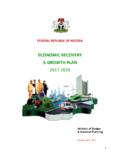Transcription of Effect of International Financial Reporting …
1 *Corresponding Author: Journal of Agricultural Economics, Environment and Social Sciences 1(1):18 29 September, 2015 Copy Right 2015. Printed in Nigeria. All rights of reproduction in any form is reserved. Department of Agricultural Economics, University of Maiduguri, Nigeria Available on line: ISSN: 2476 8423 Effect of International Financial Reporting Standards on the Financial Statements of nigerian Banks Yahaya, K. A., Fagbemi, T. O. and Oyeniyi, K. K. Department of Accounting, Faculty of Management Sciences, University of Ilorin ABSTRACT International Financial Reporting Standards (IFRS) has become the new dominant set of accounting standards; however, the transition to the new standard was fairly disruptive for users of Financial statements.
2 Comparability and trend analyses was impaired as the differences between IFRS and local Generally Accepted Accounting Principles (GAAP) impact figures presented in Financial statements and lead to variances in Financial ratios computed under the two regimes. This study examines the Effect of IFRS adoption in Nigeria on Financial statement figures and key Financial ratios of nigerian Banks that adopted IFRS. The study likewise seeks to identify the sources of differences in Financial Reporting experienced by Banks due to the changes in the regime. Secondary sources of data were used.
3 Least Squares Regression analysis was used to test the hypotheses formulated. The finding revealed that there is a significant Effect of the adoption of IFRS on the Financial statement of banks in Nigeria. Based on these findings, It was recommended that those involved in the analysis of Financial statements are advised to accord attention to the trend analysis when comparing pre-adoption data under NGAAP ( nigerian GAAP) with post-adoption data in IFRS. The comparison of Financial ratios under both NGAAP and IFRS for the comparative year prior to IFRS adoption may be seen as a prudent first step prior to undertaking a trend analysis of a particular company.
4 It may also be prudent to rely on cash flows to avoid the subjectivity inherent to accounting adjustments. Being aware of the higher volatility of accounting figures under IFRS and understanding the main categories of adjustments affecting accounting figures and ratios in IFRS may likewise be important. Keywords- Banks, Financial Statements, IFRS, GAAP INTRODUCTION International Financial Reporting Standards (IFRS) is the new dominant set of accounting standards developed under a rigorous due diligence process and now used in more than 120 countries around the world, including Australia, Brazil, Canada, the European Union, South Africa, Nigeria and many others (Deloitte Touch Tohmastu, 2013).
5 Accounting theory argues that the purpose of Financial Reporting is essentially to reduce information asymmetry between corporate managers and parties contracting with their firm (Watts, 1977; Ball, 2001) and Financial Reporting reduces information asymmetry by disclosing relevant and timely information ( , Frankel and Li 2004). Because there is considerable variation in accounting quality and economic efficiency across countries, International accounting systems provide an interesting setting to examine the economic consequences of Financial Reporting .
6 The comparison of pre-changeover Nigeria GAAP (NGAAP) to IFRS and the identification of differences between the two regimes is an important issue for users of Financial statements. The paper is organized as follows; the introduction deals with the background to the study, objectives, research hypotheses and scope of the study; the literature review reviews the recent literature on the impact of IFRS adoption on Financial statements of banks in Nigeria; it Yahaya et al. JAEESS Vol. 1 , September 2015 19 discusses the theoretical differences between IFRS and NGAAP.
7 The methodology of the analysis and the data sources are then described while the discussion of findings follows. The study concludes by highlighting the most salient aspects of our findings and providing practical recommendations for analysts and other users of Financial statements. The main objective of the study is to examine the Effect of IFRS adoption on Financial statement of Banks in Nigeria. While the specific objectives are to; i. examine the role of IFRS for quality accounting information and; ii. identify the sources of differences in Financial Reporting experienced by companies due to the changes in the regime; Research Hypothesis HO1.
8 IFRS plays no significant role in ensuring quality accounting information. HO2. There is no significant relationship between IFRS and NGAAP Scope of the Study. This study focuses on the Effect of IFRS adoption in Nigeria on Financial statement and Financial ratios. The study focused on selected nigerian Banks Financial statement for comparison of Financial ratios under both NGAAP and IFRS for the comparative year prior to IFRS adoption and the restated figures after IFRS adoption. This includes 9 banks that are listed on the nigerian Stock Exchange and the period 2012 was the basis for comparison.
9 Conceptual framework IFRS are accounting rules ( standards ) issued by the International Accounting Standard Board (IASB), an independent organization based in London, UK. Before the inception of IASB, International standards described as International Accounting Standards (IAS) were issued by the IASB s predecessor organization, the IASC, a body established in 1973 through an agreement made by professional accountancy bodies from Australia, Canada, France, Germany, Japan, Mexico, the Netherlands, the United Kingdom and Ireland, and the United States of America.
10 In 1997 after nearly 25 years of achievement, IASC recognized that to continue to perform its role effectively, it must find a way to bring about convergence between national accounting standards and practices and high-quality global accounting standards. The new Standards setting body was renamed as International Accounting Standards Board (IASB) and since April 2001, it has been performing the rule-making function. Components of IASB structure contain- IASB, IASC Foundation, International Financial Reporting Interpretations Committee (IFRIC), previously Standing Interpretations Committee, SIC under IASC), Standards Advisory Council (SAC) and Working Groups.







